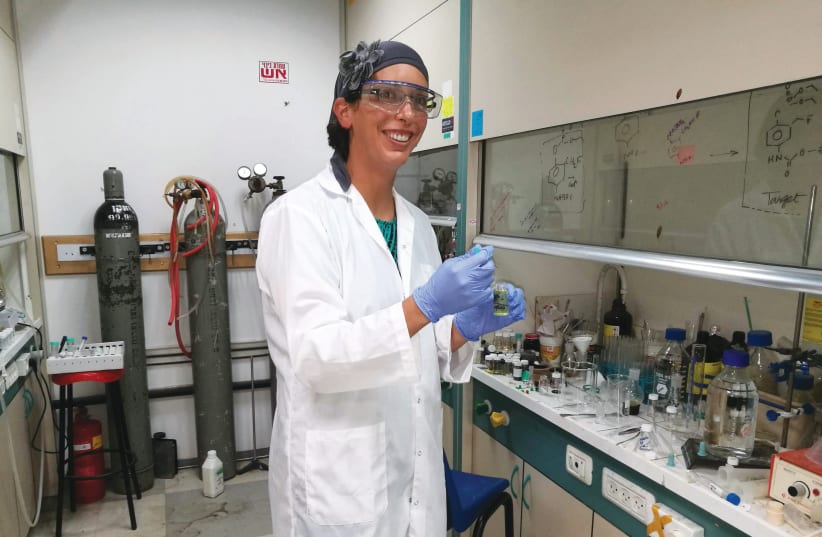She married during her doctoral studies in chemistry at Columbia University, NY. During her postdoctoral studies at MIT, the couple lived in Brookline, Mass. Afterward, when they moved to the small town of Sharon, Mindy became a tenured faculty member at the University of Rhode Island.
By that time her hard work and tenacity had resulted in a very impressive CV.
Despite a few Israeli vacations, Mindy had never lived here, though she maintains that she “wanted to live in Israel my whole life.” However, in 2018, accompanied by her husband and three children, she spent a five-month sabbatical at Bar-Ilan University. She taught two graduate classes in English, while her computer engineer husband worked remotely for Intel US. The children were happy in Givat Shmuel, and her two older boys managed well in school.
Upon her return to the US, Mindy was determined to return to Israel the following year to make aliyah. This heartfelt decision proved controversial, however, occurring concurrently with the end of her 12-year marriage.
True to her resolution, she arrived here in August 2019 with her children, where she was faced with the task of “trying to parent them in a different country.” “But I dared to do it,” she says with bravado.
Mindy describes the initial trauma of their arrival at “a pretty terrible rental apartment – a third floor walk-up – with 15 suitcases,” in the blazing heat of summer.
“I carried the cases upstairs and the boys helped,” she says, “but I hadn’t realized that the apartment had no fridge, no stove and only one air conditioner.”
Although Mindy had rented some furniture, she had to busy herself finding some second-hand appliances on Facebook. She remembers ruefully how they sat on the floor that first Friday night eating their frugal supper of chicken nuggets, potato burekas and frozen peas.
Mindy was delighted when their home in Sharon was sold, as this enabled her to buy an apartment in Givat Shmuel and improve their quality of life. She did that with record speed. They could now jettison the rental with its moldy interior. Accordingly, they moved the week of Purim, right before the first, most serious COVID-19 lockdown. In other respects too, life was looking up. “I had friends from the sabbatical, the Givat Shmuel community is fabulous, and my sixth-grader had an easy adjustment in the same school with the same friends. My third-grader enrolled in a circus course which interested him. The youngest was managing in first grade.”
Though Mindy reports that “the first semester of teaching in Hebrew was hard, as I had to master the requisite technical vocabulary,” she quickly adjusted to her new job instructing 75 premedical students at Ariel University. She was able to teach in person at the start of the academic year. Of course, by the dawning of the second semester she had to learn to convey the curriculum via Zoom, though some labs remained frontal. “Corona’s made things a little more tiring,” she admits.
Mindy directs a lab at Ariel University, focusing on analytical chemistry, or chemical sensors. Chemical detection sensing is needed to trace spoilage in mass food or beverage production facilities and may also alert to potential hazards in smaller workplaces. Homemade alcoholic drinks are an example of the latter.
“I chose research because I had an almost pathological fear of being bored,” she explains. “I had considered medicine, but really wanted to be doing something new every day. I thought about industry too, but to be honest, I wanted the regular interactions with students and the mentoring opportunities that I get from academia.”
In addition, she hopes to revive the Party Elements, a small business she had in America doing science birthday parties, whether in English or Hebrew. Mindy loves to incorporate “the element of fun” in her parties, geared mainly for ages six through nine. She puts on a show with a demonstration, followed by a hands-on activity for the group – all based on a theme, such as dinosaur science. The youngsters can “hatch” dinosaurs from ice eggs using colored salt water, for example, discover dinosaur “bones” or participate in controlled explosions. “My sixth-grader likes to assist,” she adds.
As in most families, COVID-19 presents its challenges. “My kids are around all the time, and seem to need something all the time. My oldest child doesn’t go to sleep early either, so he’s generally talking to me until 11 p.m. or asking for something (usually food). I have been fortunate in being able to work from home, but it’s hard to be focused without getting interrupted,” she says.
“My ex-husband comes to visit the children, and my parents visit when they can. They are not Israeli citizens, so it is not always so easy, but they were here last February and again for the holidays. When they are here, they help a lot with the kids.”
“In 10 years, I hope to still be living in Givat Shmuel, preferably in this same apartment,” she says regarding the future. “We are renovating one room at a time here, to really turn it into a wonderful place. My older two children have a swing in their bedroom. It’s awesome. I’m having my youngest child’s room done with a full Lego wall. I can’t wait till we get to my room!”
“I love my apartment and love my job,” Mindy declares, always resolute about looking on the bright side, and consistently inspired by her chosen field of chemistry.■
